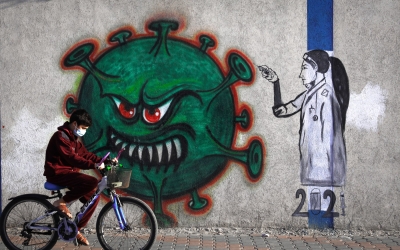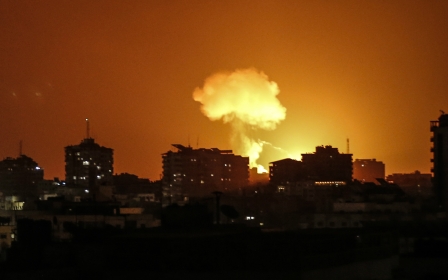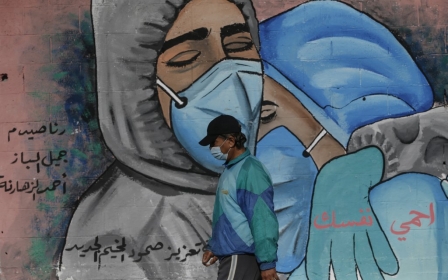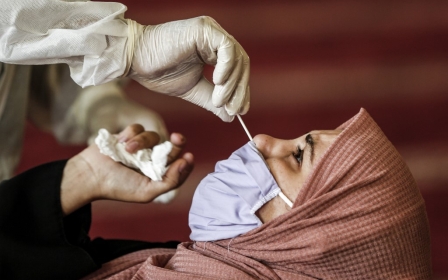'Vaccination apartheid': Gaza struggling with Covid-19 infections while Israel rolls out jab
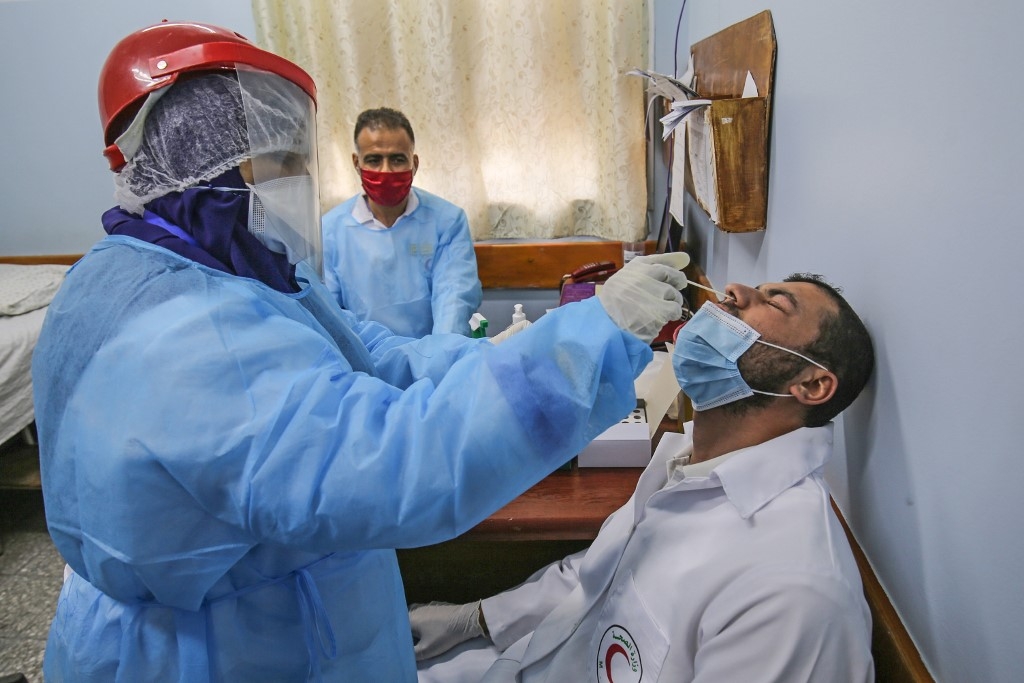
In the intensive care unit of the European Gaza Hospital lie 50 critically ill Covid-19 patients. Their doctors are not confident that the available medical supplies will be sufficient to keep them alive in the next few weeks.
With the hospital's capacities dwindling due to the rising numbers of coronavirus cases, and the already fragile healthcare system, the chances of survival for Covid-19 patients with chronic diseases in the Gaza Strip remain slim.
As of Monday 25 January, the total number of Covid-19 cases in the blockaded enclave stands at 49,834, of whom 508 died.
While the number of cases remains relatively moderate compared to other areas around the world, it is still considered “overwhelming” in Gaza, with the lack of medical supplies in hospitals and the absence of vaccines that have already been rolled out in most countries.
'While we are supposed to be given priority, given the harsh humanitarian conditions and the collapsing healthcare system, we are not even on the map of vaccination'
- Khaled Zain, Gaza resident
“At the beginning of the pandemic, when the coronavirus first appeared in Gaza, we used to receive all the cases at hospitals for treatment and follow-ups," Dr Youssef Aqqad, head of the European Gaza Hospital, told Middle East Eye. "But then we realised that the numbers were rapidly rising while the hospital capacities were very limited.
“So, we started to receive only critical cases, like those with chronic diseases or severe respiratory problems.
“We are struggling to avoid reaching a point where the healthcare system would collapse. But the sooner we get the vaccine, the easier it will be for us to manage the growing numbers of infections,” he added.
According to Aqqad, the Palestinian Ministry of Health in Gaza was “informed by international actors that the vaccine would be available in Gaza during the first quarter of 2021”.
‘Vaccination apartheid’
While the Gazan health ministry struggles to get the vaccine with the help of the World Health Organisation (WHO) and other international bodies, human rights groups believe that it is Israel’s responsibility to provide the vaccine for the blockaded enclave.
“While Israel has already vaccinated more than 20 percent of its citizens, including Jewish settlers in the West Bank, it has not committed to vaccinating Palestinians living in the same occupied territory under its military rule,” Human Rights Watch said.
The watchdog argued that it is Israel’s obligation under international humanitarian law, as an occupying power, to ensure medical supplies, including to combat the spread of pandemics in the Gaza Strip and the West Bank.
But Israeli authorities claimed that the “Palestinians are responsible for their own healthcare, under the 1990s Oslo peace accords”.
International and Palestinian activists took to Twitter to condemn Israel's move, using the hashtag "IsraeliVaccinationApartheid".
“While Israel celebrates a record-setting vaccination drive, millions of Palestinians living under Israeli control will receive no vaccine. To Israel, Palestinian lives don’t matter,” Sama tweeted.
“It hurts to know that you are a second-class population,” Khaled Zain, a resident of Gaza, told MEE. “I mean, we come right after our occupiers. While we are supposed to be given priority, given the harsh humanitarian conditions and the collapsing healthcare system, we are not even on the map of vaccination.
“To be honest, I did not even expect that the vaccine would be available in Gaza before the next year, after the pandemic is over. We are used to getting things long after the world does, it is like another planet here [in Gaza],” Zain added.
Before the outbreak of the pandemic, Gaza’s hospital system was suffering from critical shortages of supplies, including drugs and medical equipment.
‘Not our legal obligation’
Zain, 34, says that he is not optimistic that the vaccine will be available soon, while his elderly mother, who caught the virus, “is threatened with death at any moment”.
“My mother is 70 years old. She suffers from heart problems. So even before she tested positive for the coronavirus, we were worried that if she has a heart attack or needs urgent surgery, the hospitals would not be able to provide her with the adequate treatment,” he said.
“Now that the hospitals are overwhelmed with the rising numbers of [coronavirus] cases, and the vaccine is still not available - and who even knows when it will enter Gaza - I am not optimistic that my mother will get the chance to be vaccinated. More people are dying, and my mother is already in a critical condition.”
'Israel’s obligation [is] first and foremost to its citizens … but it is our interest to make sure that Palestinians get the vaccine, that we don’t have Covid-19 spreading'
- Yuli Edelstein, Israeli minister of health
Israel’s Minister of Health Yuli Edelstein said in an interview with the BBC on Sunday that “Israel’s obligation [is] first and foremost to its citizens.
“It is our interest, not our legal obligation, but it is our interest to make sure that Palestinians get the vaccine, that we don’t have Covid-19 spreading,” he added.
Under the fourth Geneva Convention, Israel is required, as an occupying power, to provide the Palestinian population, including that in the West Bank, Jerusalem and the Gaza Strip, with the necessary measures to curb the spread of the virus.
Article 56 states that an occupier should take the “prophylactic measures necessary to combat the spread of contagious diseases and epidemics”.
But Edelstein argued that “first of all we can also look into the so-called Oslo agreements, where it says loud and clear that Palestinians have to take care of their own health”.
Zain said: “If it is our government’s responsibility to provide us with the vaccine, then it should be always allowed to take charge of our healthcare, not just during the pandemic.
"We are always obliged to get Israel's permission to travel for medical treatment or to get medical supplies into the Strip. Why is it only now that we have to be responsible for our own health?"
Middle East Eye propose une couverture et une analyse indépendantes et incomparables du Moyen-Orient, de l’Afrique du Nord et d’autres régions du monde. Pour en savoir plus sur la reprise de ce contenu et les frais qui s’appliquent, veuillez remplir ce formulaire [en anglais]. Pour en savoir plus sur MEE, cliquez ici [en anglais].


